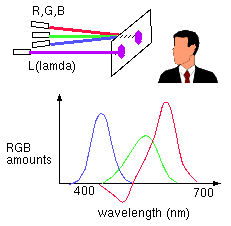Color Matching
In order to define the perceptual 3D space in a "standard" way,
a set of experiments can (and have been) carried by having
observers try and match color of a given wavelength, lambda, by
mixing three other pure wavelengths, such as R=700nm, G=546nm,
and B=436nm in the following example. Note that the phosphours of
color TVs and other CRTs do not emit pure red, green, or blue light
of a single wavelength, as is the case for this experiment.

|
|